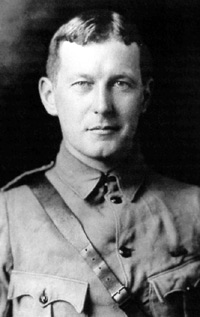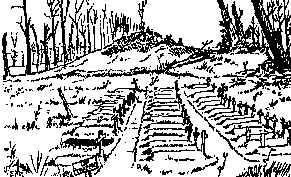
Notre Dame Legends and Lore / by Dorothy V. Corson

Wanting to know more about it drew me to the Internet to see what I could find with just these two pieces of information. Eureka, first time out, I found the poem. “In Flanders Fields,” along with the story behind how it was written. When I read it the first time, I could not help but liken it to poems and essays written by those soon to die in which the dead seem to be speaking to the living.
The Web site I was drawn to, “The First World War -- The Heritage of the Great War 1914-1918,” had this information about the poem and they very kindly allowed the use of anything on their site. The following information was just what I was looking for:
By Rob Ruggenberg
 John McCrae’s (picture left) “In Flanders Fields” remains to this day one of the most memorable war poems ever written. It is a lasting legacy of the terrible battle in the Ypres salient in the spring of 1915.
John McCrae’s (picture left) “In Flanders Fields” remains to this day one of the most memorable war poems ever written. It is a lasting legacy of the terrible battle in the Ypres salient in the spring of 1915.
The most asked question is: why poppies?
Wild poppies flower when other plants in their direct neighbourhood are dead. Their seeds can lie on the ground for years and years, but only when there are no more competing flowers or shrubs in the vicinity (for instance when someone firmly roots up the ground), these seeds will sprout
There was enough rooted up soil on the battlefield of the Western Front; in fact the whole front consisted of churned up soil. So in May 1915, when McCrae wrote his poem, around him poppies blossomed like no one had ever seen before.
It is also possible that in this poem the poppy plays one more role. The poppy is known as a symbol of sleep. The last line We shall not sleep, though poppies grow / In Flanders fields might point to this fact. Some kinds of poppies can be used to derive opium from, from which morphine can be made. Morphine is one of the strongest painkillers and was often used to put a wounded soldier to sleep. Sometimes medical doctors used it in a higher dose to put the incurable wounded out of their misery.
Flanders is the name of the whole western part of Belgium. It is flat country where people speak Flemish, a kind of Dutch. Flanders (Vlaanderen in Flemish) holds old and famous cities like Antwerp, Bruges and Ypres. It is ancient battleground. For centuries the fields of Flanders have been soaked with blood.
‘In Flanders Fields’ is also the name of an American War Cemetery in Belgium, where 368 Americans are buried. This cemetery is situated near the village of Waregem, quite a distance from the place where McCrae actually wrote his poem. The cemetery got its name from the poem though. The bronze foot of the flag-staff is decorated with daisies and poppies.
Another reference to the poem can be found on the Canadian Memorial at Vimy, in Northern France. Between the pylons, at their base, is a sculpture of a dying soldier throwing his burning torch to his comrades -- obviously referring to the last verse of the poem.
John McCrae’s poem may be the most famous one of the Great War -- sometimes only the first two verses are cited or printed. Nevertheless I will give you the full and exact version of McCrae’s great poem, taken from his own, handwritten copy. But first, here is the story of how he wrote it -- and how the recent death of a dear friend moved him:
Although he had been a doctor for years and had served in the Boer War in South Africa, it was impossible to get used to the suffering, the screams, and the blood here, and Major John McCrae had seen and heard enough in his dressing station to last him a lifetime.
As a surgeon attached to the Canadian 1st Field Artillery Brigade, Major McCrae, who had joined the McGill faculty in 1900 after graduating from the University of Toronto, had spent sixteen days treating injured men -- Canadians, British, Indians, French, and Germans -- in the Ypres salient.
It had been an ordeal that he had hardly thought possible. McCrae later wrote to his mother:
‘Seventeen days of Hades! At the end of the first day if anyone had told us we had to spend seventeen days there, we would have folded our hands and said it could not have been done’
One death particularly affected McCrae. A young friend and former student, Lieut. Alexis Helmer of Ottawa, had been killed by a shell burst on 2 May 1915. Lieutenant Helmer was buried later that night in the little cemetery (called Essex Farm), just outside McCrae’s dressing station. McCrae had performed the funeral ceremony in the absence of the chaplain, reciting from memory some passages from the Church of England’s ‘Order of Burial of the Dead.’ This had happened in complete darkness, as for security reasons it was forbidden to make light.
 The next morning, sitting on the rearstep of an ambulance parked near the dressing station beside the Yser Canal, just a few hundred yards north of Ypres, McCrae vented his anguish by composing a poem. The major was no stranger to writing, having authored several medical texts besides dabbling in poetry
The next morning, sitting on the rearstep of an ambulance parked near the dressing station beside the Yser Canal, just a few hundred yards north of Ypres, McCrae vented his anguish by composing a poem. The major was no stranger to writing, having authored several medical texts besides dabbling in poetry
In the cemetery (see the drawing right by Edward Morrison), McCrae could see the wild poppies that sprang up from the ditches and the graves, and he spent twenty minutes of precious rest time scribbling fifteen lines of verse in a notebook.
A young soldier watched him write it. Cyril Allinson, a twenty-two year old sergeant-major, was delivering mail that day when he spotted McCrae. The major looked up as Allinson approached, then went on writing while the sergeant-major stood there quietly. ‘His face was very tired but calm as he wrote,’ Allinson recalled. ‘He looked around from time to time, his eyes straying to Helmer’s grave.’
When McCrae finished five minutes later, he took his mail from Allinson and, without saying a word, handed his pad to the young NCO. Allinson was moved by what he read:
‘The poem was an exact description of the scene in front of us both. He used the word blow in that line because the poppies actually were being blown that morning by a gentle east wind. It never occurred to me at that time that it would ever be published. It seemed to me just an exact description of the scene.’
Allinson’s account corresponds with the words of the commanding officer at the spot, Lieutenant Colonel Edward Morrison. This is how Morrison described the scene:
‘This poem was literally born of fire and blood during the hottest phase of the second battle of Ypres. My headquarters were in a trench on the top of the bank of the Ypres Canal, and John had his dressing station in a hole dug in the foot of the bank. During periods in the battle men who were shot actually rolled down the bank into his dressing station. Along from us a few hundred yards was the headquarters of a regiment, and many times during the sixteen days of battle, he and I watched them burying their dead whenever there was a lull. Thus the crosses, row on row, grew into a good-sized cemetery. Just as he describes, we often heard in the mornings the larks singing high in the air, between the crash of the shell and the reports of the guns in the battery just beside us.’
The poem (initially called We shall not sleep) was very nearly not published. Dissatisfied with it, McCrae tossed the poem away, but Morrison, [his commanding officer], retrieved it and it was later published in Punch on December 8, 1915.
-- Rob Ruggenberg

|
In Flanders fields the poppies blow
We are the Dead. Short days ago
Take up our quarrel with the foe: |
Reading the above poem, recalled to my mind that Joyce Kilmer had also written a poem for his fallen comrades shortly before he was killed in action on July 30, 1918, near Ourcq in France. He was buried beside a stream that bears the same name. He is best known for his poem, “Trees.”
The Scholastic recorded these thoughts and these lines from his poem written for his fallen comrades before his own death: “How applicable to himself are the concluding lines of his ‘Rouge Bouquet’ poem: ‘Comrade true, born anew, peace to you / Your souls shall be where the heroes are / And your memory shine like the morning star.’
It seems that war poems and essays in which the dead speak are not all that rare. Even Kipling did it.
When I’ve finished my Grotto mission my next mission will be to transcribe my father's World War I trench warfare diaries and compile his cartoon postcards, photographs and memorabilia from World War I.
Dorothy V. Corson
April 5, 2003